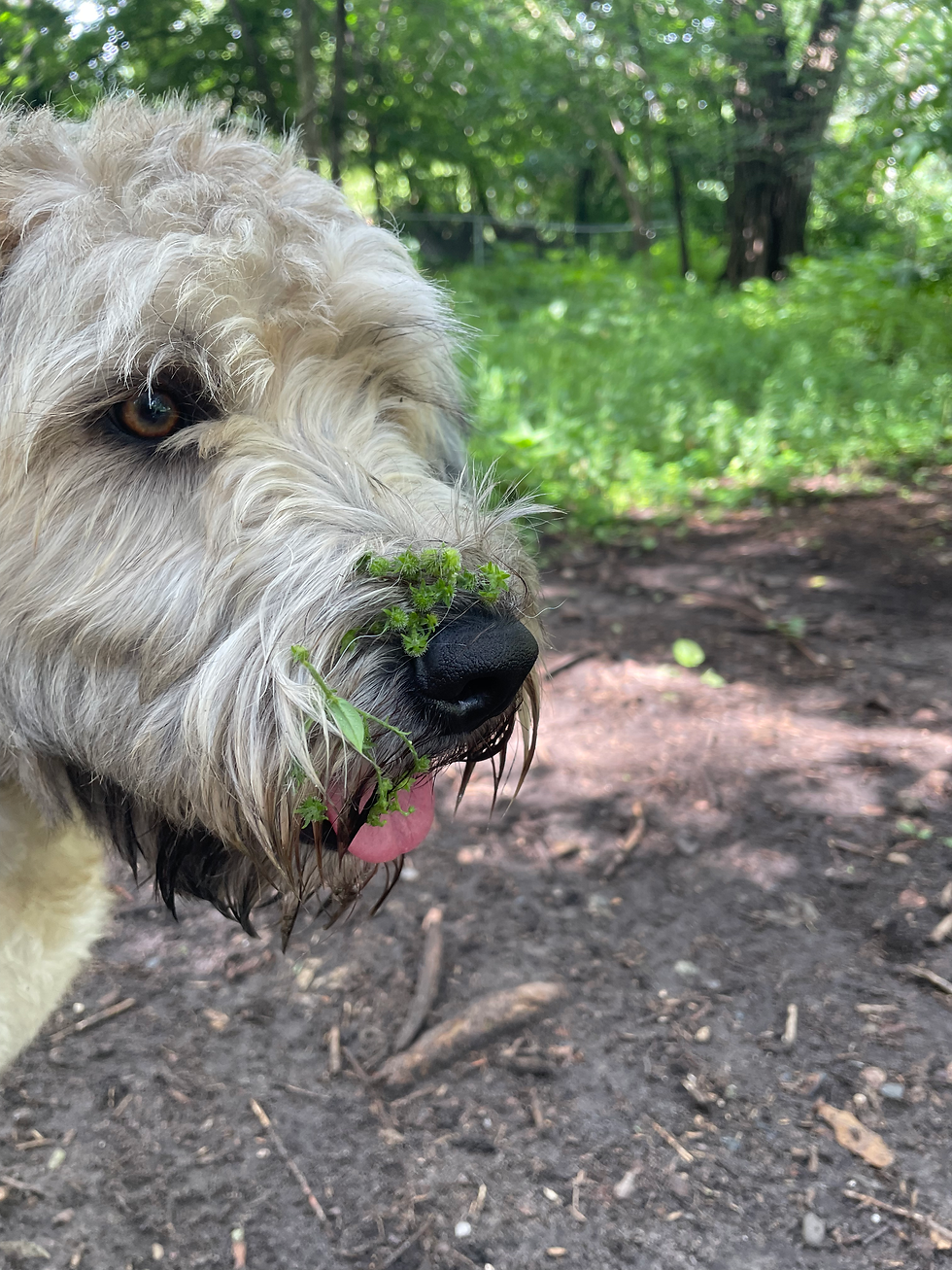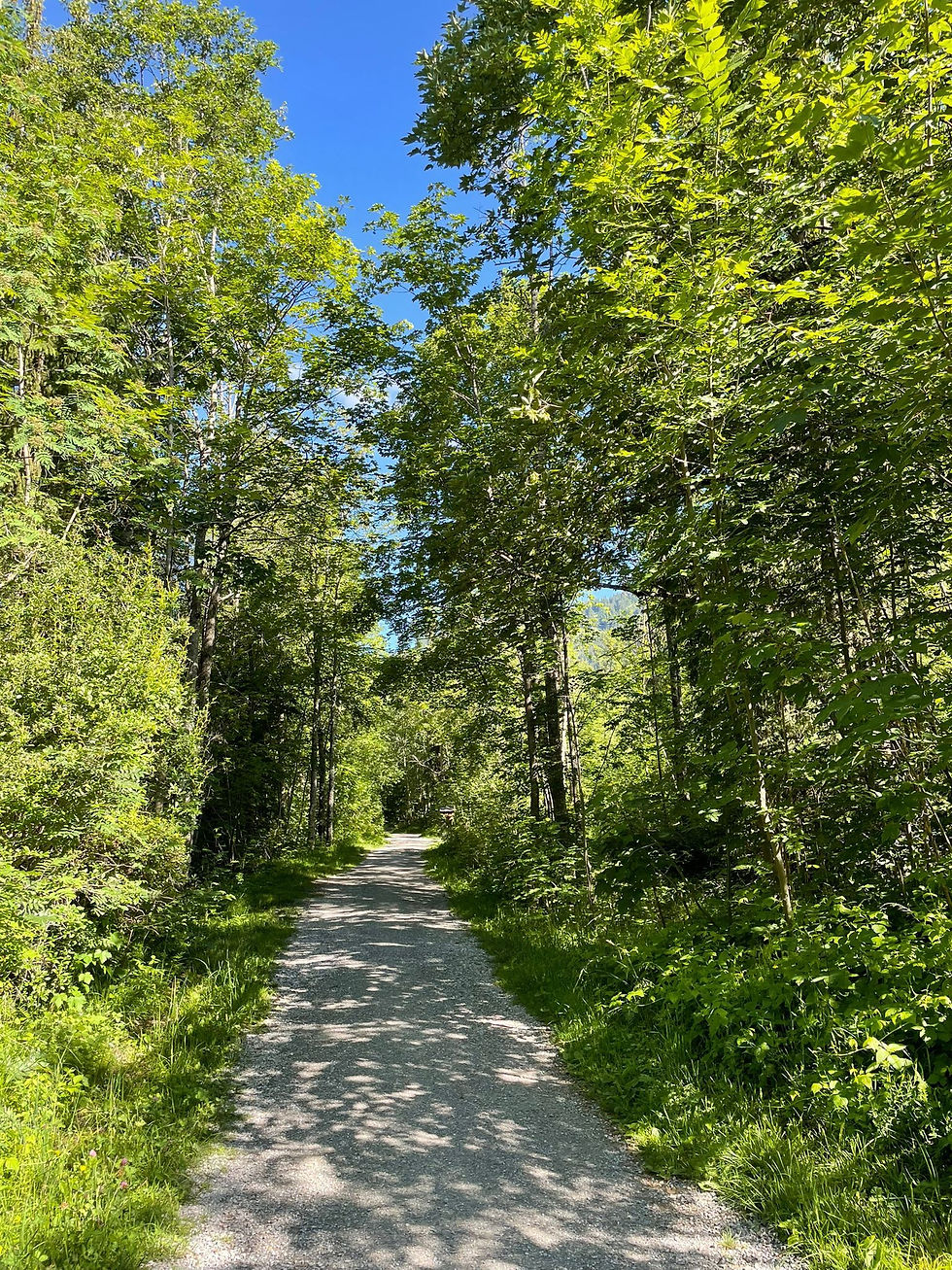When the World Feels Heavy: Finding Calm, Hope, and Space for Grief in Nature
- Sep 2, 2025
- 5 min read
“You can’t stop the waves, but you can learn to surf.”
by Jon Kabat-Zinn

Some days, it feels like the weight of the world is too much to carry. The constant stream of news; political unrest, disagreements, crime, wars, environmental crises, AI changing the world, unending human suffering, and so on, can cling to us like invisible burdens. They hitch a ride on our minds and hearts until we feel exhausted, irritable, or disconnected from who we are at our core.

Recently, while walking my dog, I noticed how quickly Virginia stickseed began to attach itself to her fur. These tiny seeds seemed harmless at first, a few here and there, but before long her coat was peppered with them, tangled deep into her hair.
Here’s the thing: during the walk, there was no way she’d let me remove them. I had to wait for the right moment, a time when we were both calm and comfortable, to patiently work them free. And it took time, seed by seed, until her fur was clean again.
It struck me how much this mirrors our own lives. Worries, grief, and troubles, both personal and global, accumulate quietly until we’re weighed down. Sometimes, we try to rip them out too quickly, and it only causes more pain. But if we slow down, breathe, and tend to ourselves in moments of calm, we can begin to release what’s been clinging to us.
Grief Is More Than Loss of a Person
Often, when we hear the word “grief,” we think only of the death of someone we love. But grief is far more expansive. It is the natural human response to any kind of loss.
We grieve when freedom or safety feels uncertain, when a child struggles or moves away, when a relationship shifts or ends, when health changes or falters, when work changes or is lost, when a friendship drifts apart, when parents age, or when a beloved home changes hands. We grieve the change of seasons and the passing of time, when something turns out differently than we hoped, or when the mirror reminds us of years gone by.
Every change carries with it a sense of something lost.
In truth, we live alongside grief every day. Some losses are small and fleeting; others shape us for a lifetime. But all deserve space. When we deny grief, it doesn’t disappear. It just tangles itself deeper, the way those little seeds did in my dog’s fur.
Allowing space for grief is not weakness. It’s part of being human.
The Quiet Work of Letting Go: Invitations from Nature

Letting go of accumulated worry or grief isn’t about pretending the problems don’t exist. It’s about creating space to honor what has been lost, while allowing life to keep moving through us. Nature often helps us do just that by offering invitations to notice, pause, and simply be present.
Here are some invitations you might explore:
Spend Time with a Fallen Tree or Old Stump
Maybe you notice how the bark feels beneath your hand — rough, soft, or crumbling.
Maybe you notice patterns of decay and new growth: fungi, moss, or tender shoots pushing upward.
Maybe you wonder what story this tree would tell about its life — its strength, its endings, and its beginnings.
Watch The Weather
Maybe you notice how the air touches your skin — cool, warm, damp, or dry.
Maybe you listen to the wind: is it a soft whisper or a rushing force?
Maybe you notice how the weather shifts your own mood or body, making you feel lighter, heavier, or more at rest.
Spend Time Observing A Living Being: Tree, Plant, or Animal
Maybe you notice how it moves or stretches toward light.
Maybe you notice the smell of leaves, the texture of bark, or the sound of rustling.
Maybe you wonder what its persistence or fragility awakens in you.
Explore the Patterns in The Landscape
Maybe you notice contrasts—places of flourishing and places of erosion.
Maybe you notice repetition—leaves, branches, or ripples in water.
Maybe you wonder: Where do I see suffering? Where do I see healing? What surprises me here?
Spend Time with A Tree or The Trees
Maybe you notice the leaves or flowers—beauty woven in with everything else that grows.
Maybe you notice the roots—deep, unseen, steady in the soil, or sometimes exposed above it.
Maybe you notice the trunk—solid, strong, something you could lean against.
Maybe you notice the branches without leaves, their cuts and scars still belonging to the wholeness of the tree.
Maybe you notice the canopy above—branches reaching toward the light, reminding you of something larger than this moment.
Sit by A Stream, Pond, or Lake
Maybe you notice the surface—still, rippling, or stirred by the wind.
Maybe you notice the reflections—trees, clouds, or sky shimmering across the water.
Maybe you notice the depths—dark, hidden, full of mystery and life unseen.
Maybe you notice the edges—stones, reeds, or moss marking the meeting place of water and land.
Maybe you notice the movement—gentle flow, rushing current, or the way water circles back on itself.
Maybe you notice the sound—soft trickle, steady rhythm, or a quiet stillness that holds its own silence.
These invitations don’t require anything of you. They simply create space to be with the natural world. You may find yourself grounding more deeply, resting in the moment, or noticing an inner shift. You may discover a word of comfort, a piece of wisdom, or even a story that nature seems to whisper. Or you may simply be — without needing anything to happen. All of it is possible. All of it belongs.
Why Nature Holds Our Grief Well
The benefits of slowing down and connecting with nature are well-documented.
Forest walks lower stress hormones and help regulate our nervous system.
Exposure to green spaces improves mood and reduces symptoms of anxiety and depression.
Nature invites mindfulness — the kind of presence that allows us to name, honor, and gently release grief without rushing it.
When I guide clients through forest therapy, I often see grief surface in unexpected ways; through tears, through silence, through a sudden deep breath. And I’ve also seen how the forest receives it all without judgment. Unlike people who may try to fix or explain grief, nature simply holds us, steady and unhurried.
Taking Your First Step

If you’re feeling weighed down by the state of the world or by losses closer to home, I invite you to find your own moment of calm. Step outside. Breathe deeply. Allow the living world to hold space for your grief and remind you that you are rooted, resilient, and part of something much bigger.
Let the grief and worries that have been clinging to you loosen their hold. One by one, you can tend to them, not in haste, but with care until you can feel yourself again.
If you’d like to explore this process in a guided way, you can join any Foresttherapy Guide or search for a Eco-Therapist near you.
You can also contact me for a forest therapy session or a nature-based psychotherapy session.
Together, we’ll create space for both grief and hope, so that the sticky seeds of sorrow and worry don’t define you and you can move forward with resilience, compassion, and deeper connection to yourself and the earth.




Comments